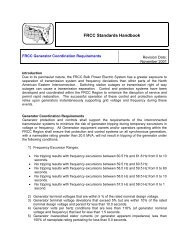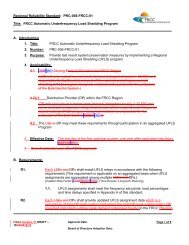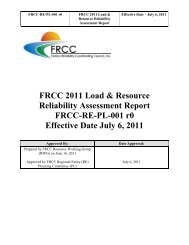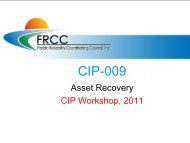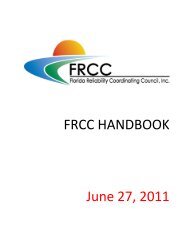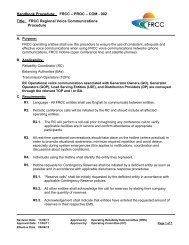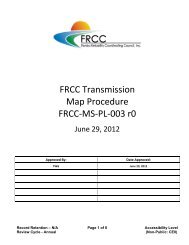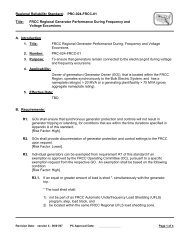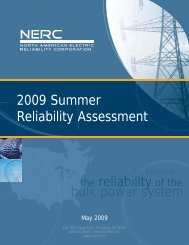2009 Scenario Reliability Assessment - NERC
2009 Scenario Reliability Assessment - NERC
2009 Scenario Reliability Assessment - NERC
- No tags were found...
Create successful ePaper yourself
Turn your PDF publications into a flip-book with our unique Google optimized e-Paper software.
<strong>Scenario</strong> <strong>Reliability</strong> Self-<strong>Assessment</strong>s1) A potentially large influx of new, intermittent capacity resources like wind generation. 43Currently, New England has very little existing wind capacity (less than 100 MW ofnameplate), but concerns exist over the resultant impacts from compliance with stateRenewable Portfolio Standards (RPS), and the corresponding build-out of these newsupply-side resources in the near-term. Because of this and other operational concerns,ISO-NE is currently embarking on a major wind integration study to identify the detailedoperational issues of integrating large amounts of wind resources into the New Englandpower grid. This wind study will also propose solutions to those problems.2) The unknowns associated with upcoming nuclear plant relicensing that is scheduled tooccur within a 3 to 16 year time frame, 44 and,3) The potential need to modify, refurbish, or retire both river and coastal, steam-generationpower plants that currently use “once-through” cooling with “closed-loop” coolingsystems. Current rulemaking at the United States EPA, which has been recently ruled onby the U.S. Supreme Court, injects uncertainty into the process for which revisedNPDES 45 water permits may soon mandate cooling tower arrangements in order toreduce the impact on aquatic life due to power plant cooling operations.The first issue (#1) is an emerging operational issue. The last two issues (#2 and #3) can becombined and categorized as a potential loss of operable capacity, with that potential loss beingeither temporary or permanent in nature. The reliability impacts stemming from the last twoissues equate to a resource adequacy issue.This <strong>Scenario</strong> Case that is submitted by ISO-NE includes these same Reference Case unknownsconcerning new wind power development, nuclear plant relicensing, and the potential need forretrofitting closed-loop cooling, but more importantly, it identifies several key issues withrespect to potential impacts on system operations which could result from the postulated rapidinflux of new renewable resources into New England’s power system. Aside from the straightforwardcomparisons of capacity margins and resource adequacy between the <strong>2009</strong> Long-Term<strong>Reliability</strong> <strong>Assessment</strong> Reference Case and this <strong>Scenario</strong> Case, the <strong>Scenario</strong> Case deals morewith trying to identify and gauge the impacts on system operations due to the commercializationof numerous types of new supply and demand-side technologies.It should be noted, however, that a short-coming of this <strong>Scenario</strong> Case is that many of these new,supply-side renewable resources like wind that are not yet fully commercialized within theRegion. Also, the numerous amounts of demand-side resources which are spearheading theinstallation of new “smart-grid” technologies within the field, are technologies that are new toNew England, and subsequently, are relatively unknown with respect to grid operations. Thus,these new supply and demand-side resources have minimal operating hours from which to43 Currently, ISO-NE has approximately 2,500 MW (total) of new onshore & offshore wind projects requestingstudy within its Generation Interconnection Queue.44 Within New England, approximately 1,300 MW of nuclear capacity has their current NRC Operating Licenseexpiring within a three-year timeframe and approximately 3,350 MW of nuclear capacity has their current NRCOperating License expiring within a sixteen-year timeframe.45 The National Pollutant Discharge Elimination System (NPDES).Page 64<strong>2009</strong> <strong>Scenario</strong> <strong>Reliability</strong> <strong>Assessment</strong>



